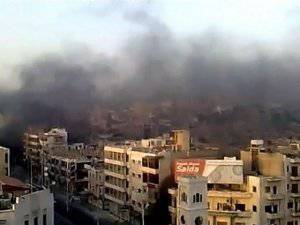EU introduces new sanctions against Syria
 Conflicting data comes from Syria. Damascus reports that on the eve of the approaches to the city of Ham and he himself were occupied by foreign fighters, and the police and army liberated the city and put things in order there. At the same time, the Syrian opposition talks about the fact that in fact there was a shooting of a peaceful demonstration, and that Ham was blocked by the Syrian military. The EU Council apparently decided to believe the opposition and impose additional sanctions against Damascus. In particular, freeze bank assets and prohibit thirty-five representatives of the Syrian authorities from entering the European Union. In addition, an embargo was imposed on the supply to Syria weapons. And the UN Security Council is preparing for an emergency meeting.
Conflicting data comes from Syria. Damascus reports that on the eve of the approaches to the city of Ham and he himself were occupied by foreign fighters, and the police and army liberated the city and put things in order there. At the same time, the Syrian opposition talks about the fact that in fact there was a shooting of a peaceful demonstration, and that Ham was blocked by the Syrian military. The EU Council apparently decided to believe the opposition and impose additional sanctions against Damascus. In particular, freeze bank assets and prohibit thirty-five representatives of the Syrian authorities from entering the European Union. In addition, an embargo was imposed on the supply to Syria weapons. And the UN Security Council is preparing for an emergency meeting.According to reports by opponents of the country's government, the army is destroying civilians in the city of Hama, according to a government agency opposite, the army is fighting with armed militants who are storming government agencies and police stations.
According to official data, the militants took hostage civilians and fired indiscriminate fire from machine roofs with machine guns and grenade launchers at soldiers who tried to dismantle the barricades. According to Arab TV channels, 145 people were killed in Syria within 24 hours, while only 113 residents died in the city of Hama. Authorities say that tough actions do not concern the civilian population. For example, in Ham, according to official data, the troops were introduced after pogroms began in the city with dozens of dead and wounded.
But in the West, they have already drawn conclusions and unequivocally decided who in this stories will be the "bad guy." The leadership of the European Union demands that those responsible for the murder of protesters in Hama be brought to justice and declare that even against grenade launchers and machine guns, the authorities do not have the right to use military equipment. US President Barack Obama said: "I am shocked by the brutality of the Syrian government and the violence it is doing against its own people."
UN Secretary-General Ban Ki-moon called on the Syrian government to "immediately end this violent offensive operation." But what is interesting is that the head of the UN is closely watching Syria, and before Yemen, where fighting has been going on for months between government forces and members of extremist groups, and people have also died, the UN has nothing to do.
Since gaining independence from France, Syria immediately became a very influential player in Middle Eastern politics. It was official Damascus that was a close ally of the USSR in the region, the country's leadership has always been very anti-Western and anti-Israeli oriented. Syria openly supports Iran, Palestinian militants and the Lebanese Hezbollah party. Syria has a strong army, the sixteenth largest in the world. It is worth noting that the current President Bashar Assad and his father Hafiz Assad in Syria, as often happens in the East, the power passed from father to son. They managed to build a fairly balanced system, where, on the one hand, the state rather tightly controls the lives of citizens, and on the other hand, it provides social guarantees and stability. For example, in Syria, free medicine is not particularly difficult for young students to go to study, and the state pays for this study.
Dissatisfaction with the government, but it still exists, is due to religious reasons. The problem is that most people in the country are Sunni Muslims. And the leadership is made up of Alawites, whom some theologians consider to be a Muslim sect, others do not belong to Muslims, but to a particular cult. This is what caused the events of February 1982, which went down in history as the "Hama massacre." It was in the same city almost thirty years ago that the Syrian army suppressed the Islamists, led by the Muslim Brotherhood terrorists. About 40 thousands of people were killed then. Actually, since then, little has changed in Syria, and among Muslims there are still quite a few dissatisfied with the top alavist. And they can become, if they have not already become, that fifth column.
The activity of Western leaders did not go unnoticed in Damascus, and Syrian President Bashar Asad congratulated the military on the occasion of the anniversary of the country's army, and said bluntly that Syria was confronted with a planned conspiracy aimed at "dividing the country and subsequent fragmentation of the entire region a state. "
Information